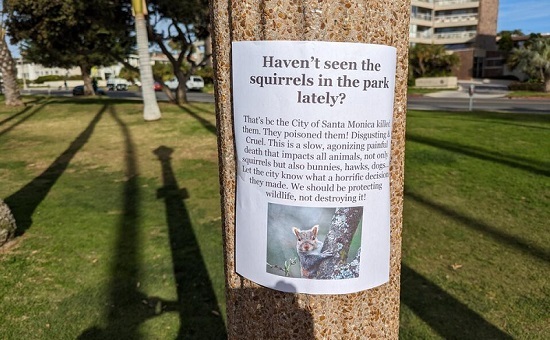By Jorge Casuso
January 4, 2023 -- Where are the squirrels?
That question is being posed on a flier urging strollers in Palisades Park to call Santa Monica City officials who made the "horrific decision" to poison them.
And it's being asked by Councilmembers who are seeing a sudden interest in the squirrel population after the issue went into hibernation 17 years ago.
 |
| Flier in Palisades Park (Courtesy of Lee Jackson) |
"There were tons of baby squirrels there (in Palisades Park) this summer, and now there are no squirrels," said Councilmember Phil Brock. "So what happened?"
Dog walker Lee Jackson asked the same question in an email to the City Council on Christmas Day that included a picture of the flier he saw in the park.
"If they were indeed poisoned, this is outrageous and unacceptable!" Jackson wrote. "I would expect this approach from some town in Texas or Alabama.., not Santa Monica!!
"Whoever suggested this should be removed from their job immediately," he wrote. "Whoever approved this should be removed from their job immediately."
Councilmember Brock decided to dig into the highly volatile issue he had first encountered in 2006 when he served on the Santa Monica Recreation & Parks Commission.
Back then, animal advocacy groups and residents protested the gassing of hundreds of squirrel burrows in the seaside park with a lethal dose of aluminum phosphide ("Ground Squirrels Exterminated under City Manager’s Orders," February 13, 2006).
County Supervisor Zev Yaroslovsky and Councilmember Kevin McKeown, who were in power then, tried unsuccessfully to halt the killings prompted by a summons from the County Health Department to immediately reduce the ground squirrel population.
After exploring options that included trapping the rodents live, euthanizing them and feeding them to raptors in rehabilitation, the City's last result was gassing the squirrels.
"People were out protesting," Brock recalled. "The (exterminator) had to have a police car escort."
So when the issue reared its head again last fall, Brock emailed City Manager David White.
"We talked briefly about Palisades Park squirrels some weeks ago," Brock wrote on November 10. "I am now getting very vocal residents saying we are killing our squirrels and begging for help.
"Give me a quick summary of what is occurring, if anything please."
White responded that "operationally, nothing has changed.
"It is my understanding that we have always maintained bait stations in Palisades Park and we have been evaluating alternative products," he wrote referring to the poisoned bait.
"Most of the ground squirrels burrow in the bluffs which is state owned up to the California Incline and we don’t perform rodent control on state property."
On Tuesday morning, Brock emailed White asking for an update.
"I am receiving more mail regarding the disappearance of squirrels in Palisades Park and the city connection," Brock wrote.
That evening, White responded.
"While some residents may express concern about the welfare of ground squirrels, the City is required to control their population because they are known to be carriers of diseases such as the bubonic plague," White wrote.
"Our control measures are required, overseen, and inspected by the LA County Department of Public Health and Agricultural Commissioner/Weight and Measures.
"Non-compliance will result in fines and closure of the park," White wrote. "The City is not taking any extraordinary measures."
Brock noted that the squirrels were tested in 2006 and "they didn't have the plague."
He also noted that squirrel population growth was an ongoing problem poisons can't eradicate.
"If you kill them, the squirrels that are left have more babies quicker to make up for the lost population," he said.
White informed informed him that new bait stations had been installed at the recommendation of LA County inspectors but it will take several months to gauge results.
"We hope to assess their effectiveness in the Spring/Summer, when the ground squirrel population becomes active," White wrote.
"Squirrels tend to be dormant during the cold/wet winter season, which likely explains the visible reduction in their numbers at Palisades Park."